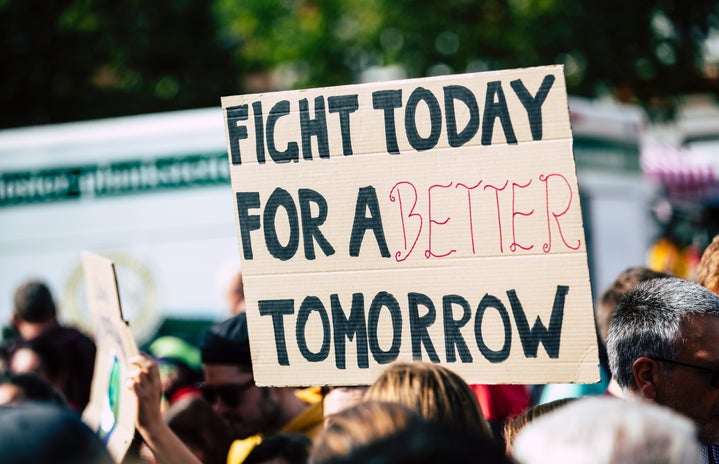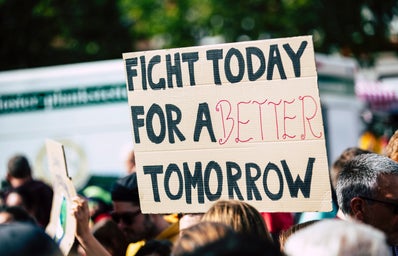Protesting is an important political statement as well as a constitutional right under the Canadian Charter of Rights and Freedoms, but it’s important to adhere to some general rules for personal safety.
With the recent rise in demonstrations involving transgender legislation and current events in Palestine and Israel, many are taking their beliefs and calls to action to the streets.
Protesting for the first time in a city as big as Toronto can be scary and unknown, especially during this time. Due to this, here is some important information all new protestors should know.
- Protect Your identity
-
Protesting means taking an active stance of disapproval against someone or something. To ensure your privacy, it’s beneficial to remain anonymous while protesting. In the current digital age, it’s not uncommon for protesters to experience doxxing from those opposing their beliefs. Doxxing, specifically in this case, refers to the collection of a user’s private information, which is then used to harass them across platforms.
You can maintain confidentiality by covering any identifiable details of your appearance, such as tattoos or scars. An easy way to do this is by wearing loose, full-coverage clothing. Remember, a protest is not a fashion show, so always prioritize safety over being seen as trendy. You can also consider wearing a mask to hide facial features from cameras and opposing protestors.
- Know your rights
-
As previously stated, the right to protest is protected under the Canadian Charter of Rights and Freedoms. As with all protected rights, there are some limitations. The assembly must be peaceful, as the Charter does not protect those who disturb the peace. It’s also not ethical to rally people to incite hate.
There is almost always a police presence at protests. Oftentimes, police are present just to manage the crowd and prevent noise levels from getting out of hand. Despite this, recently, there have been several cases of people being arrested at peaceful demonstrations in Toronto. As a general rule, it’s wise to avoid interactions with the police at protests.
If police officers question you, you have the right to remain silent and not answer them. You don’t need to give them any of your personal information. For safety reasons, it’s best to remain respectful in interactions with the police while protesting, but also don’t let them force your hand. While you can stay quiet, it’s illegal to lie to law enforcement. If you are arrested, remember you are entitled to the right to remain silent and contact a lawyer.
- Don’t go alone
-
When planning to attend a protest, reach out to others and formulate a plan on how to look out for one another. This is important because protests can be dangerous, and it’s a lot easier to target protestors who are alone. If you cannot find friends to go with you, consider looking for protesting support groups or finding a buddy as soon as you get there.
Also, make sure to have a person outside of the protest to contact in case things go wrong. Before you leave, tell them where you are going and when you plan to return, and keep them updated as the protest progresses. It’s also recommended that you have the number of a lawyer in case of detainment.
- Be prepared
-
Protests can last for long periods of time. It’s important to eat before you go and bring snacks to sustain you throughout the day. Having low energy levels in large crowds can lead to dizziness and fainting. It’s also crucial to bring water for the same reasons. Many protests take place in areas with access to safe drinking water, but it’s always better to have a bottle consistently on hand while protesting.
According to many accredited medical sources, including Medical News Today, water is the best method of cleaning out eyes that have been pepper sprayed. If this happens to you, remove anything near or on your eyes and immediately flush them out with water. Do not touch or put anything else in your eyes, as this can cause irritation.
Because most protests don’t have a set time frame, always charge your phone completely before leaving. If you know that you will be protesting for a long time, consider bringing a portable charger.
Bring only the most important items you need and nothing else, as large crowds and unpredictability can make it easy to lose or break things. Bring only your phone, identification, charger, cash, snacks, water and signs.
- Respect others
-
Do not film other protesters without their consent. Not only can this lead to doxxing and harassment, but not everyone is comfortable being filmed. Direct your cameras toward police action and violations of human rights.
Being in the crowd at a protest is often packed. Be respectful of the space of others and try to accommodate those who you see struggling. At a demonstration, everyone rallying is often on the same side. Support your peers who need it.
Protests are not intended to be places to go just to take pictures to post on social media. While speaking out online can be impactful, it’s best to avoid posting about protests for safety reasons. Posting your involvement at a protest directly ties you to the event, which is unwise in case something goes wrong.


